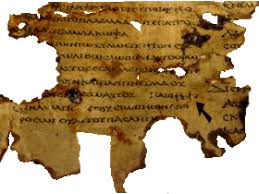 Abstract: 1 Corinthians 8 and 10 are very similar to Romans 14, and explain why the “weak” Christians in Rome did not eat meat. The reason was that new converts to Christianity, based on their experience with idolatry, regarded meat sacrificed to idols as unfit for Christians.
Abstract: 1 Corinthians 8 and 10 are very similar to Romans 14, and explain why the “weak” Christians in Rome did not eat meat. The reason was that new converts to Christianity, based on their experience with idolatry, regarded meat sacrificed to idols as unfit for Christians.
SIMILARITIES
Consider the similarities between 1 Corinthians 8 & 10 and Romans 14:
-
-
- In both, the problem is both meat and what people drink (Rom 14:1, 21; 1Co 8:13; 10:31).
- In both, Paul declares that “everything” is allowed (Rom 14:14, 20; 1 Cor. 10:23).
- In both, the person who eats meat gives thanks to God and eats without guilt (Rom 14:6; 1 Cor. 10:26, 30).
- Both refer to the “weak” brother (1Cor 8:7, 9-12; Rom. 14:1) in contrast to mature Christians.
- In both, Paul warns the person that “has faith” that eating meat can “become a stumbling block to the weak” (1Cor 8:9, 13; Rom. 14:13, 20-21).
- In both, Christ’s disciples are urged to consider others before themselves (Rom 15:1, 2; 1 Cor. 10:24, 33). This is, in fact, the main message of Romans 14. Paul summarizes the whole thrust of the passage by these words, “Let each of us please his neighbor for his good, to edify him” (Rom. 15:2).
- In both, the appeal is to abstain rather than to cause another’s fall (Rom 14:1, 21; 1 Cor. 8:9, 11-13). Paul’s plea is for the more mature Christian to consider his weak brethren before himself.
-
MEAT SACRIFICED TO IDOLS

Corinthians may, therefore, explain why meat was regarded by some in the church in Rome as “unclean” (koinos) and thus to be avoided. The problem in Corinth was not meat per se, but the association of meat with idol worship. Most of the available meat in the city has been “sacrificed to idols” (8:1; 10:19). The strong “know that there is no such thing as an idol” (8:4), and were able to dine in an idol’s temple (8:10) without misgivings. But some of the Gentiles who had been converted from idolatry were still “weak” (8:9) and bound by superstitious beliefs that meat sacrificed to idols gave idols power over them. They ate meat “as a thing offered to an idol” (8:7).

This made eating meat “a stumbling block to the weak” (1Cor 8:9, 13). The “weak” brother that sees another Christian eating in an idol’s temple might be tempted to do the same (8:10) and he might be ruined thereby (8:11), because for him eating meat is idol worship (8:7). For that reason, Paul urged the mature Christian to consider others before himself (1 Cor. 10:24, 33) and to rather abstain from meat than to cause another’s fall (1 Cor. 8:9, 11-13).
ARTICLES IN THIS SERIES
-
-
- Romans 1: God will not override human freedom.
- Romans 2: The doers of the Law will be justified.
- Romans 3:1-8: Did God reject Israel?
-
ROMANS 9 AND 11
-
-
- Complete Article: Who Israel is in the Book of Revelation?
- All Israel will be saved: Topical summary of the previous article
- Election: God chose Israel to save the nations of the world.
-
ROMANS 14
-
-
- 1-4 – The dispute in Rome was not over the Law of Moses.
- The meaning of the word “unclean” (koinos)
- Why new Christians feared eating meat sacrificed to idols.
- 5-6 – Is the Sabbath is optional?
- 7-13 – God will judge all people by their deeds.
- 13-23 – Rather abstain from meat than causing a brother to stumble.
-
For a more complete description of these articles, see the List of available articles on Romans. For general discussions of theology, I recommend Graham Maxwell, who you will find on the Pineknoll website.


